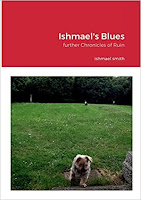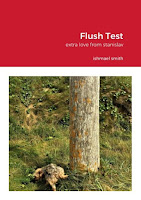An Easter Meditation
Do you remember Kate Adie? Of course you do - the belligerent and fearless BBC reporter who brought a little touch of glamour to warzones and Tiananmen Square.

Anyway, she's dead old now, and has a face only fit for radio, not that we're lookist here on our inclusively diverse and intersectional blog, and she absolutely refuses to retire, although you'd think she could afford to, so there I was in my studio the other day, when her unmistakeable BBC voice pops up on Radio Four - which usually provides a soothing background to my artistic endeavours, although occasionally I have to hurl an Oh Do Fuck Off and turn the damn noisy box off. She was in Belarus, so I paid attention - I'm particularly fond of Belarus, as I follow a Youtuber couple who provide me with snippets of idyllic rural Belarussian life.
Katie, in a suitably solemn voice, was exposing the dreadful treatment of female prisoners in Belarus. Having bobbed in and out of a great many prisons in England in my former incarnation as a Probation Officer, I took a professional interest, wondering how Belarus would measure up against HMP Styal, for example. Kate told me how female prisoners are sent to penal colonies where they are made to sew uniforms for the armed forces. Ah, yes, thought I, we call them prisons, not penal colonies - but we also teach our female prisoners to sew - it is an important life skill and a conduit for artistic expression. Tasmania is very proud of the Rajah Quilt, which was made by female convicts on board the ship Rajah, which departed Woolwich on the 5th April 1841, on its 105 day voyage from England to Hobart Town, transporting 179 female convicts. The British Ladies' Society for Promoting the Reformation of Female Prisoners, established by the Quaker, Elizabeth Fry, provided needles, thread and patchwork pieces. The completed quilt bore the inscription, in cross stitch:
TO THE LADIES
of the
Convict ship committee
This quilt worked by the Convicts of the Ship Rajah during their voyage to Van Diemans Land is presented as a testimony of the gratitude with which they remember their exertions for their welfare while in England and during their passage and also as a proof that they have not neglected the Ladies kind admonitions of being industrious
June 1841

The sewing lessons conducted at HMP Styal allowed one woman convict, released on license to me, after serving a sentence for various offences including assault, failure to pay fines imposed for working as a common prostitute and dealing heroin to fund her own addiction, to set up a small business making curtains and duvet covers. Which did well, gaining her more orders for home textiles than she could reasonably fulfil, so she expanded and took on a partner. All was going well until her pimp decided that this was taking the piss and she needed to be back on the streets where she belonged.
Back to Kate Adie, who told me that the majority of female prisoners were not sent to penal colonies, but were held on house arrest, allowed to leave their homes to go to work and for an hour a day for recreation. That sounds like a sensible and kindly dispensation - maybe we could introduce it here? - as women can keep their jobs, remaining economically active, keep their homes and look after their children at home. What happens in the UK is that, lacking such a sentence of house arrest, women in prison tend to lose their jobs, homes and children as relatives or social services have to step in to raise the kids. Kate didn't seem keen on this criminal justice measure, though, being most lugubrious about it - maybe it was the name put her off - it is called Chemical Detention. Nope, the women are not given chemicals to subdue them, unlike in the U.K., where the "liquid cosh" is regularly administered to the over-excitable. The name lingers from the days when female prisoners were held in dormitories and required to work in chemical factories.
So, what did I learn from Katie's description of the Belarussian treatment of female prisoners? She should get out less and take her reporter's eye into the British criminal justice system, pots and kettles, desist from throwing stones if you live in a glass house, don't criticise the mote in your neighbour's eye when you have a ruddy great plank in your own. And that this is how propaganda is made - reasonable BBC voices deploring the internal affairs of another country, broadcasting with great reasonableness to reasonable middleclass people in Middle England who have never been nearer a nick in their lives than watching an exciting prison drama - which they can happily distance themselves from because those women are all lowlife pondscum. Unlike the noble female political prisoners of Belarus. Ah, there's the rub, as our boy Hamlet might say. That is what was getting Kate all liberal on the wireless. Not proper crims, political crims. Belarus has more political prisoners than Russia, thundered Kate.

And? So? What has that got to do with us? We have our political prisoners - Rose Dugdale, bomb maker and activist for the IRA, who died on the 18th March, served a nine year prison sentence - every country has its dissidents. HMP Long Lartin, our high security prison in leafy Worcestershire, had its own wing for IRA prisoners, who all regarded themselves as political prisoners and looked down on the murderers and rapists although their activities had murdered far more than the common crims managed to do. No doubt these Just Stop Oil protesters, defacing Britain's heritage, would regard themselves as political prisoners.
The thing is, a sovereign state - definition: "a state with a defined territory that administers its own government and is not subject to or dependent on another power" - has its own laws, defines its own crimes and sets its own criminal or surveillance systems. It's another country. They do things different there. If you don't like it, don't go there. You've got your own country to reform. Start up a 2024 branch of the British Ladies' Society for Promoting the Reformation of Female Prisoners. But watch out for the pimps.
Kate and her other chums in the Propaganda Broadcasting Corporation, are manipulating public opinion. As blatantly as that.
Here's a link to the Youtube channel about an ordinary, law abiding couple renovating a forest house in Belarus. You need to turn the subtitles on, as there's no voice over. mr mongoose will like it, as it is all about ripping out, rebuilding, levelling and concrete pouring set in the most idyllic forest.
Talking of mr mongoose, vast apologies are in order. Easter crept up on me this year, and, to my shame, I didn't remember to ask mr mongoose for an Easter crossword. Maybe he'll appreciate the time off. He has told us he is compiling a crossword for the General Election, although, as that is most unlikely to be in May, maybe mr mongoose could give us an interim May Bank Holiday crossword?
Happy Easter, ishmaelings everywhere.








































